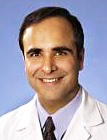SOMERSET, N.J., Aug. 21, 2013 – The Post-Finasteride Syndrome Foundation today announced the funding of a second major clinical study on post-finasteride syndrome (PFS), this one at Baylor College of Medicine (BCM) in Houston, Texas.
 Titled “Genetic and Epigenetic Studies on Post-Finasteride Syndrome Patients,” the research is being led by Mohit Khera (right), MD, MBA, MPH, Assistant Professor of Urology in the Scott Department of Urology and Director of the Laboratory for Andrology Research, McNair Medical Institute at BCM.
Titled “Genetic and Epigenetic Studies on Post-Finasteride Syndrome Patients,” the research is being led by Mohit Khera (right), MD, MBA, MPH, Assistant Professor of Urology in the Scott Department of Urology and Director of the Laboratory for Andrology Research, McNair Medical Institute at BCM.
The objective of the study is to determine why PFS patients develop sexual dysfunction.
PFS has been reported to occur in men who have taken the prescription drug finasteride to treat hair loss (under the brand name Propecia and generics), or enlarged prostates (Proscar and generics).
Reported symptoms include loss of libido, erectile dysfunction, suicidal ideation, anxiety, panic attacks, Peyronie’s disease, penile shrinkage, gynecomastia, muscle atrophy, cognitive impairment, severely dry skin, tinnitus, and depression. The condition often has a life-altering impact on victims and their families, such as job loss and the breakup of marriages and romantic relationships, while also being linked to suicides.
On July 1, the PFS Foundation announced the funding of its first clinical PFS study, at Brigham and Women’s Hospital (BWH) in Boston, a teaching affiliate of Harvard Medical School. That study aims to identify causes of the condition at the molecular level.
Details of the BCM study are as follow:
Principal Investigator: Mohit Khera, MD.
Institution: Baylor College of Medicine; St. Luke’s Episcopal Hospital and The Methodist Hospital.
Title: Genetic and Epigenetic Studies on Post-Finasteride Syndrome Patients.
Objective: To study why the patient population of post-finasteride syndrome (PFS) patients develops sexual dysfunction.
Methods: To (i) evaluate sexual and psychological function, (ii) assess hormone levels, (iii) measure penile hemodynamic and sensory parameters, (iv) study androgen receptor genetics and gene expression, and (v) and determine gene expression patterns and profiles.
Why This Study is Important
- This study will evaluate parameters of peripheral sexual function in patients with PFS.
- This study will uncover the underlying biological mechanisms related to the wide array of symptoms in PFS patients which closely match those of the androgen deprivation syndrome.
- This systematic investigation will help identify the genetic footprint of PFS and the array of deregulated androgen dependent functions.
- This study will elucidate the hormonal, genetic and epigenetic molecular mechanisms of the PFS.
- This study will provide leads for the development of mechanism-specific therapeutic strategies.
Patient recruitment for the BCM study got under way in July/August 2013.
Patients interested in participating in the study should email Sharon A. Harrison, Administrative Coordinator for Dr. Khera: sharons@bcm.edu
“Coupled with the Brigham and Women’s Hospital study, the Baylor research promises to pave the way for PFS therapies by uncovering the root causes of this condition that is likely affecting thousands of men worldwide,” said PFS Foundation CEO Dr. John Santmann.
On April 11, 2012, the Food and Drug Administration ordered drug manufacturer Merck to revise the labeling on Propecia to reflect mounting evidence that it can cause persistent sexual dysfunction. Of the 421 Propecia-related sexual dysfunction cases reviewed by the FDA in its probe, 14 percent lasted longer than three months after patients quit the drug.
About Mohit Khera
Specializing in andrology, sexual wellness and male reproductive medicine, Dr. Khera is Assistant Professor of Urology in the Scott Department of Urology and Director of the Laboratory for Andrology Research, McNair Medical Institute at the Baylor College of Medicine. He also serves on the board of directors of the Sexual Medicine Society of North America (SMSNA) and the executive council of the American Society of Andrology (ASA), while serving as Associate Editor of the Journal of Sexual Medicine. Dr. Khera earned his medical degree from The University of Texas Medical School at San Antonio. After finishing a six-year residency in urology at Baylor, he completed a one-year fellowship in male reproductive medicine and surgery with Dr. Larry I. Lipshultz. Dr. Khera edited the most recent edition of the book Urology and the Primary Care Practitioner, and in 2009 won the SMSNA Basic Science Award.
About Baylor College of Medicine
Baylor College of Medicine in Houston is recognized as a premier academic health science center and is known for excellence in education, research and patient care. It is the only private medical school in the greater southwest and is ranked as one of the top 20 medical schools for research in the country and number one in Texas by U.S. News & World Report. BCM is listed 17th among all U.S. medical schools for National Institutes of Health funding, and No. 2 in the nation in federal funding for research and development in the biological sciences at universities and colleges by the National Science Foundation. Located in the Texas Medical Center, BCM has affiliations with nine teaching hospitals. Currently, BCM trains more than 3,000 medical, graduate, nurse anesthesia, and physician assistant students, as well as residents and post-doctoral fellows. Follow BCM on Facebook and Twitter.
About the PFS Foundation
Headquartered in Somerset N.J., the Post-Finasteride Syndrome Foundation was established in July 2012 as a 501(c)(3) organization, with private grants from families in the U.S. and abroad. Tax-deductible financial donations to the nonprofit organization can be made via PFSFoundation.org, which also houses published research, research goals, and media reports about PFS.
# # #
Contact
Media Relations Manager
The Post-Finasteride Syndrome Foundation
media@pfsfoundation.org
(856)425-6046
